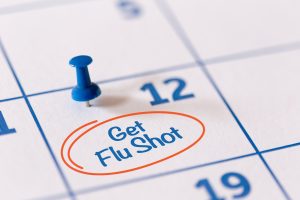 DOVER – Lab-confirmed cases of influenza in Delaware have increased significantly over the last few weeks. The week ending Dec. 30, 2017, saw 142 confirmed flu cases, an increase of 48 percent over the previous week. For those who have not yet gotten their flu vaccine this season, the Division of Public Health (DPH) is providing another opportunity for Delawareans to get a shot at its annual Legislative Hall flu clinic.
DOVER – Lab-confirmed cases of influenza in Delaware have increased significantly over the last few weeks. The week ending Dec. 30, 2017, saw 142 confirmed flu cases, an increase of 48 percent over the previous week. For those who have not yet gotten their flu vaccine this season, the Division of Public Health (DPH) is providing another opportunity for Delawareans to get a shot at its annual Legislative Hall flu clinic.
The clinic, which is also open to the public, will be held Jan. 17, 2018, from 9:00 a.m. to 3:30 p.m. in the Legislative Hall Library. DPH staff will administer flu shots to Delawareans 6 months of age and older. Adults should bring photo identification for admittance to Legislative Hall and do not need appointments. Persons with Medicaid or Medicare should bring insurance cards. Legislative Hall is located at 411 Legislative Ave., Dover, DE 19901. Free street and lot parking is available.
“With a 48 percent increase in flu cases during this past week, I urge Delawareans to take the flu seriously, and if you have not already done so, to get your flu vaccine as soon as possible,” said DPH Director Dr. Karyl Rattay. “January is not too late to get a flu shot, and in fact, as long as flu is still circulating in the community, those who have not received a shot can still get one.”
Delaware is one of 46 states reporting widespread influenza activity, according to the DPH and the Centers for Disease Control and Prevention (CDC). There have been 370 laboratory-confirmed flu cases so far during the 2017-2018 flu season, with 95 hospitalizations and two deaths.
DPH asks people who have flu symptoms, and especially those at high risk for complications, to contact their primary care provider immediately to begin treatment. DPH also asks medical providers to begin antiviral treatment for all hospitalized patients and all high-risk patients with suspected influenza. Antiviral medications are prescribed by health care providers to lessen the symptoms, shorten the illness, and prevent complications of flu illnesses. Antivirals work best when administered within 48 hours of the onset of symptoms and are particularly important for pregnant women and people with chronic health conditions.
In addition to getting a flu shot and taking antiviral medication, DPH recommends:
- Keeping your distance from others if you have cold or flu-like symptoms.
- Washing your hands frequently with soap and water or use alcohol-based hand sanitizers.
- Covering sneezes and coughs with a tissue, and disposing of tissues immediately; if no tissue is available sneezing or coughing into your inner elbow.
- Staying home if you are sick until you are free of fever for 24 hours – with a temperature of less than 100 degrees F (37.8 degrees C), without the use of fever-reducing medications for at least 24 hours.
Flu vaccines continue to be available at many pharmacies and grocery stores, and through primary care physicians and some specialists. To find participating stores, enter your zip code in the CDC flu vaccine finder at https://www.cdc.gov/flu/. For more information about the flu, visit http://flu.delaware.gov or call DPH at 1-800-282-8672.
Flu shots are still available at DPH clinics located within the State Service Centers:
- Hudson State Service Center, 501 Ogletown Road, Newark. For all ages, including children age 6 months and older. Call 302-283-7587 (choose Option 2) to make an appointment Monday through Friday.
- Williams State Service Center, 805 River Road, Dover. For all ages, including children age 6 months and older. Call 302-857-5140 to make an appointment Monday through Thursday, 8:00 a.m.to 3:30 p.m.
- Milford State Service Center – Riverwalk, 253 N.E. Front St., Milford. For ages 9 years and older. Call 302-424-7130 to make an appointment on Mondays only, 9:00 a.m. to 4:00 p.m.
- Anna C. Shipley State Service Center, 350 Virginia Ave., Seaford. For all ages, including children age 6 months and older. Walk-ins welcome Fridays only, 8:30 a.m. to 12:00 p.m. and 1:00 p.m. to 4:00 p.m. For information, call 302-628-6772.
For more information about flu surveillance in Delaware, read the Week 52 flu report at http://dhss.delaware.gov/dph/epi/influenzawkly.html.
A person who is deaf, hard-of-hearing, deaf-blind or speech-disabled can call the DPH phone number above by using TTY services. Dial 7-1-1 or 800-232-5460 to type your conversation to a relay operator, who reads your conversation to a hearing person at DPH. The relay operator types the hearing person’s spoken words back to the TTY user. To learn more about TTY availability in Delaware, visit http://delawarerelay.com.
Delaware Health and Social Services is committed to improving the quality of the lives of Delaware’s citizens by promoting health and well-being, fostering self-sufficiency, and protecting vulnerable populations. DPH, a division of DHSS, urges Delawareans to make healthier choices with the 5-2-1 Almost None campaign: eat 5 or more fruits and vegetables each day, have no more than 2 hours of recreational screen time each day (includes TV, computer, gaming), get 1 or more hours of physical activity each day, and drink almost no sugary beverages.